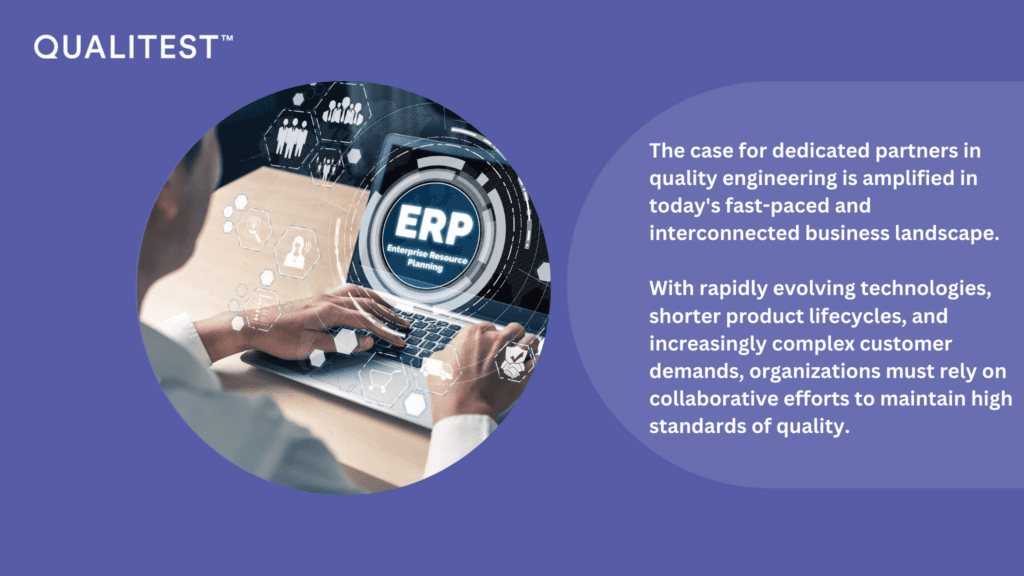Enterprise Resource Planning (ERP) systems play a crucial role in making things run smoothly, boosting efficiency, and driving business growth. But let’s be real, implementing and optimizing ERP solutions can be quite a challenge, especially when it comes to ensuring top-notch quality and engineering excellence. That’s where having dedicated testing partners becomes super important. These partners bring their specialized expertise and resources to the table, making the ERP journey smoother and maximizing success.
Quality engineering requires dedicated partners to make sure ERP projects are a success – here’s why
Quality engineering is a complex field that demands attention to detail, rigorous testing processes, and continuous improvement. Having dedicated partners in quality engineering ensures that all these important elements are consistently maintained throughout the entire product development process. These partners bring their specialized skills, tools, and resources, which complement the efforts of in-house teams and strengthen the overall quality assurance process. Whether it’s in software development, manufacturing, or service industries, having dedicated partners in quality engineering provides valuable insights and support in identifying, addressing, and preventing defects. This ultimately enhances the reliability and performance of products and services.
In today’s fast-paced and interconnected business world, the need for dedicated partners in quality engineering is more important than ever. With technology evolving rapidly, shorter product lifecycles, and customers’ increasing demands, organizations have to rely on collaboration to maintain high quality standards. Dedicated partners bring a fresh perspective and often have specific knowledge in certain areas, helping uncover blind spots and optimize quality assurance strategies.
And here’s the thing: in a global marketplace where supply chains are sprawling and regulatory requirements are stricter than ever, having trusted partners in quality engineering streamlines compliance efforts and reduces risks associated with quality control. Strong partnerships in quality engineering foster innovation, speed up time-to-market, and build customer trust, all of which drive sustainable business growth in competitive markets.
So, having dedicated testing partners is not just a nice-to-have, it’s a must-have for ensuring ERP success and keeping your business ahead of the game.

Why should quality engineering be managed by a dedicated testing partner?
Quality engineering and quality assurance practices should be managed by a dedicated testing partner rather than by system integrators who are specialized in implementing, customizing, and integrating ERP systems to meet the needs of organizations. Some of the key reasons why a dedicated partner is a must for quality engineering include:
- Specialist expertise: dedicated Quality Engineering testing partners have specialized expertise in QA/QE methodologies, tools, and techniques specifically tailored for ERP systems. They bring a depth of knowledge and experience that may surpass what system integrators can offer in terms of testing proficiency.
- Independence and objectivity: Quality Engineering testing partners operate independently from system integrators, ensuring objectivity and unbiased evaluation of the ERP system. This independence leads to more thorough testing and identification of potential issues that might be overlooked by internal teams.
- Comprehensive Quality Engineering testing coverage: partners can provide comprehensive testing coverage across different modules, integrations, and functionalities of the ERP system. They conduct various types of testing such as functional testing, performance testing, security testing, usability testing, and regression testing to ensure the system meets quality standards.
- Risk identification and mitigation: dedicated Quality Engineering testing partners excel in identifying and mitigating risks associated with ERP implementations. They are experts in risk-identification and risk-mitigation planning including risk-based testing, prioritize critical functionalities, and provide actionable insights to address potential risks at every stage before they impact system performance or user experience.
- Advanced testing tools and technologies: Quality Engineering testing partners leverage advanced testing tools and technologies that enhance testing efficiency, accuracy, and effectiveness. They may utilize automation tools for regression testing, load testing tools for performance testing, and security scanning tools for vulnerability assessments. What’s more, they often have access to a wide range of specialized tools and techniques specifically designed for testing ERP systems. These tools can automate testing processes, enhance test coverage, and provide detailed insights into system performance and behavior.
Understanding the value of dedicated partnerships in quality engineering
When it comes to ERP software partnerships these should foster collaboration, trust, and mutual understanding between engineering teams and their partners, whether they are suppliers, vendors or other stakeholders are key. Some of the ways that dedicated partners can add value in quality engineering include:
- Best practices and standards compliance: Quality Engineering testing partners are well-versed in industry best practices and standards for quality assurance and engineering. They can ensure that the testing process adheres to relevant standards such as ISO, IEEE, or other industry-specific regulations, enhancing the overall quality of the ERP system. In addition, Early involvement of a Quality Engineering specialist challenges that position and drives clarity on requirements and visibility of business processes, ensuring better implementation and fewer defects.
- Scalability and flexibility: Quality Engineering testing partners offer scalability and flexibility in testing efforts. They can quickly ramp up or down based on project requirements, ensuring optimal testing coverage and efficiency throughout the implementation lifecycle.
- Reuse and re-purpose: as far as the ERP systems testing is concerned, most of Quality Enginering testing partners have pre-build test accelerators (test cases that are already documented on standard ERP implementation and that can be repurposed for similar engagements). These test accelerators help with productivity from day one. Quality Engineering partners also maximize the repurposing of existing test assets across different testing phases, that not only saves lot of test design time but also cost.
- A dedicated focus on testing: Quality Engineering testing partners have a dedicated focus quality and “right first time” implementation, allowing them to allocate sufficient time, resources, and expertise to ensure thorough testing of the ERP system. This dedicated focus reduces the chances of overlooking critical issues or risks during testing.
- Improved user experience: by leveraging user-centric testing methodologies, dedicated Quality Engineering testing partners can identify usability issues, accessibility concerns, and user experience improvements within the ERP system. This leads to a more intuitive and user-friendly system, enhancing overall user satisfaction and adoption rates.
- Regulatory compliance and security: Quality Engineering testing partners specialize in security and compliance validation, ensuring that the ERP system meets regulatory requirements and security standards. They conduct vulnerability assessments, penetration testing, and data privacy audits to safeguard sensitive information and protect against cybersecurity threats.
- Enhanced communication and collaboration: working with a dedicated testing partner fosters better communication and collaboration among project stakeholders. Quality Engineering testing partners act as independent facilitators, bridging communication gaps between business users, IT teams, and system integrators, resulting in smoother implementation processes and quicker issue resolution.
- Continuous improvement and feedback: testing partners provide valuable feedback and recommendations for continuous improvement throughout the ERP system lifecycle. They conduct post-implementation reviews, performance monitoring, and ongoing evalution to identify areas for optimization, enhancements, and future upgrades.
- A reduced time to market: by accelerating development cycles, identifying issues early, and streamlining testing processes, dedicated Quality Engineering testing partners contribute to reducing business process improvement and modernization for ERP system implementations. This allows businesses to realize benefits sooner and stay competitive in the market.
Gaining access to the best talent for ERP system implementation success
Independent testing organizations will also have access to the most recent quality practices and resources skilled in new technologies. Most testing organizations have their own centers of excellence and are associated with the best tool vendors for the most recent in testing stacks. They bring the benefit of a huge information base and expertise derived from long stretches of cross-industry testing knowledge.
Partnering with an organization that possesses a deep pool of skilled Quality Engineering testing professionals can significantly mitigate risks associated with ERP implementation, such as system failures, data breaches, and operational disruptions. The best Quality Engineering testing talent excels not only in executing comprehensive testing protocols but also in understanding the intricacies of ERP systems, enabling them to identify potential issues and offer strategic solutions proactively.
Accessing the best Quality Engineering testing talent involves a rigorous selection process that evaluates a partner’s proficiency, experience, and track record in ERP implementations. Collaborating with an organization that employs certified testing professionals with specialized knowledge in ERP systems quality engineering assures your implementation across various modules and functionalities.
Risks associated with relying only on system integrators for quality assurance
Relying solely on system integrators for quality engineering and assurance can provide challenges. These include:
- A lack of Quality Engineering skills: system integrators may lack specialized skills and expertise required for comprehensive QA/QE of complex ERP systems. This can result in gaps in testing coverage and challenges in identifying technical and design issues, particularly in the face of a lack of requirements.
- Limited specialist resources: system integrators may face resource constraints, especially during peak project phases, which can affect the thoroughness and effectiveness of Quality Engineering testing efforts. This may result in inadequate risk assessment early in the implementation engagement, inadequate testing coverage and increased risk of defects.
- Inadequate Quality Engineering process: system integrators may not have well-defined testing processes and frameworks in place, leading to ad-hoc Quality Engineering practices, inconsistent results, and difficulties in tracking and managing quality test activities.
- Conflict of interest: system integrators may have a conflict of interest when conducting testing as they are also responsible for system development and integration. This can lead to lack of coverage and bias in testing and overlooking critical issues.
Final thoughts
The use of dedicated Quality Engineering partners for quality assurance and engineering in ERP system implementations offers a strategic advantage for businesses. If organizations leverage specialized expertise, comprehensive testing coverage, and have a focus on risk reduction, they can achieve improved system reliability, enhanced user experience, cost savings and regulatory compliance.
These benefits contribute significantly to the success of ERP projects, ensuring they meet business objectives, deliver value to stakeholders, and drive competitive advantage in the marketplace. Embracing Quality Engineering is not just best practice, but a critical component of optimizing ERP success.




